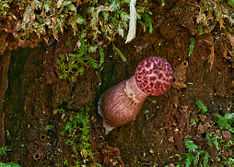Boletellus emodensis
From Wikipedia, the free encyclopedia
| Boletellus emodensis | |
|---|---|
 | |
| Scientific classification | |
| Kingdom: | Fungi |
| Division: | Basidiomycota |
| Class: | Agaricomycetes |
| Order: | Boletales |
| Family: | Boletaceae |
| Genus: | Boletellus |
| Species: | B. emodensis |
| Binomial name | |
| Boletellus emodensis (Berk.) Singer (1942) | |
| Synonyms[1] | |
|
Boletus emodensis Berk. (1851) | |
Boletellus emodensis, commonly known as the shaggy cap, is a species of fungus in the family Boletaceae. It was described by English mycologist Miles Joseph Berkeley in 1851 as Boletus emodensis,[2] and transferred to Boletellus by Rolf Singer in 1942.[3] Characterised by a distinctive reddish shaggy cap, it grows in Eucalypt woodlands. It produces a brown spore print, and has fusiform (spindle-shaped) spores that are 16–20 by 7–9 μm with longitudinal grooves. It is similar in appearance to Boletellus ananiceps, but the latter species is scaly rather than shaggy, has a pinkish tint, and lacks grooves in the spores.[4]
References
- ↑ "Boletellus emodensis (Berk.) Singer 1942". MycoBank. MycoBank. International Mycological Association. Retrieved 2011-10-26.
- ↑ Berkeley MJ. (1851). "Decades of fungi. Decades XXXII, XXXIII. Sikkim Himalaya fungi, collected by Dr. J.D. Hooker". Hooker's Journal of Botany and Kew Garden Miscellany 3: 39–49.
- ↑ Singer R. (1942). "Das System der Agaricales. II". Annales Mycologici 40: 1–132 (see p. 19).
- ↑ Young A.M. (2005). A Field Guide to the Fungi of Australia. Sydney, Australia: UNSW Press. pp. 187–8. ISBN 0-86840-742-9.
This article is issued from Wikipedia. The text is available under the Creative Commons Attribution/Share Alike; additional terms may apply for the media files.